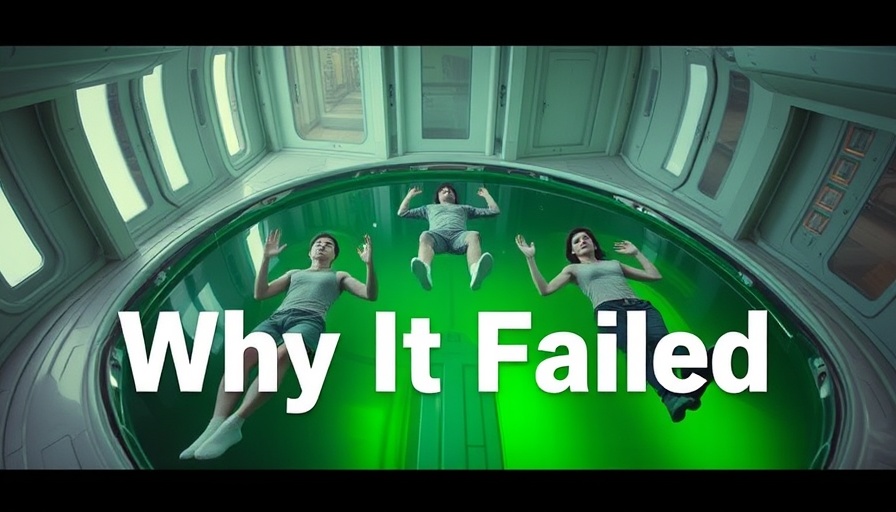
The Unforeseen Downfall of Starship Troopers
When Starship Troopers hit theaters in 1997, it was built up to be a blockbuster. With a budget surpassing $100 million and directed by Paul Verhoeven, who previously achieved fame with films like RoboCop and Total Recall, it seemed destined for success. Yet, against all odds, it failed to connect with audiences and critics of its time.
Why the Movie Missed Its Target Audience
The cultural landscape of the late 90s played a significant role in the film's lack of success. Audiences were drawn to films featuring established stars, with marketing campaigns often built around actors' popularity. In a year dominated by hits such as Men in Black and Liar Liar, Starship Troopers starred relatively unknown actors like Casper Van Dien and Denise Richards. The absence of an A-list marquee name meant there was a lack of immediate draw for audiences looking for familiar faces.
Moreover, critical reception was less than favorable. Major critics like Roger Ebert labeled it as a superficial spectacle, dousing enthusiasm before it truly had a chance. Audiences echoed this sentiment with a mediocre CinemaScore of C+, causing a substantial loss of momentum at the box office.
The Satirical Undertones Deserve Recognition
Time has bestowed a paradoxical gift upon Starship Troopers. Initially regarded as a failure, it has now gained status as a beloved cult classic, enlightening viewers to its intricate layering of satire. Many critics failed to recognize the deeply embedded satire in the film, particularly regarding militarism and fascism. Verhoeven's take transformed a heavy script into an exaggerated, over-the-top commentary that stands in stark contrast to the earnest sentiments present in the original novel by Robert Heinlein.
The film's clever execution of satire showcases how effective it is in mirroring the very ideologies it seeks to critique. The exaggerated performances, dramatic orchestral score, and a premise that glorifies violence ends up creating a masterclass in irony, which resonates with modern viewers who appreciate the social commentary more than they did at the time of release.
Contrasting Views on Legacy and Impact
Comparatively, movies focused on pure entertainment tend to dominate box office success, and Starship Troopers challenged this notion. By addressing serious subjects under the guise of a sci-fi action film, it could confuse audiences expecting straightforward entertainment. As articulated by film scholars, it offers a juxtaposition to contemporary blockbusters, demonstrating how it has paved the way for other films that leverage satirical subtexts.
However, the appreciation of such complexity took time, and not everyone was ready for a film that demanded its viewers engage intellectually. This divide prompts insightful questions: How do we differentiate between films worth our time and those that will merely entertain?
Lessons for Modern Filmmakers and Marketers
The rise and fall of Starship Troopers offers sagacious reflections for today's filmmakers and marketers. One key takeaway is the need for strong foundational marketing, especially in an era when recognizable stars significantly influence box office performance. Additionally, it illustrates the importance of audience perception and reception – a movie synonymous with contemporary entertainment standards might not translate into immediate success if it plays against those expectations.
In the age of social media and constant content consumption, filmmakers might ask themselves how they can strike the perfect balance between entertainment and thought-provoking content. Are we past the point of merely enjoying escapism, or will we soon see a resurgence of films willing to take risks like Starship Troopers did?
The Empire Strikes Back: A Lasting Cinematic Legacy
Ultimately, Starship Troopers provides valuable discourse around artistic intent, interpretation, and audience engagement. Looking back two decades later, it’s clear that movies don't always achieve success on their first release. Instead, they require time to gain context and audiences willing to engage with deeper themes. Today, it stands proudly as a testament to how art can bridge gaps, spark conversations, and provoke thought long after the credits roll.
As we navigate the ever-evolving landscape of cinema, one can only hope more films take risks like Starship Troopers. Its legacy is not merely a relic of its time; it is a call to action for filmmakers who dare to question and challenge the status quo.
Now, as the film industry recovers from recent disruptions, creative minds must consider how to balance commercial appeal with the pursuit of challenging narratives. In doing so, let us encourage a media ecosystem that values complexity, ingenuity, and daring expression. Perhaps the next Starship Troopers lurks around the corner, ready to redefine cinematic expectations once more!
 Add Row
Add Row  Add
Add 




Write A Comment